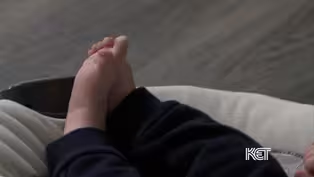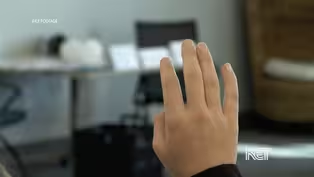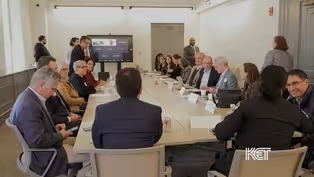
Certificates of Need and Healthcare Access
Clip: Season 2 Episode 211 | 4m 1sVideo has Closed Captions
Some believe reforming "certificate of need" will help with access to healthcare.
Parts of the state face obstacles getting enough mental and physical healthcare for their people. Some believe reforming "certificate of need,” a regulatory process governing healthcare facilities, might be the answer.
Problems playing video? | Closed Captioning Feedback
Problems playing video? | Closed Captioning Feedback
Kentucky Edition is a local public television program presented by KET

Certificates of Need and Healthcare Access
Clip: Season 2 Episode 211 | 4m 1sVideo has Closed Captions
Parts of the state face obstacles getting enough mental and physical healthcare for their people. Some believe reforming "certificate of need,” a regulatory process governing healthcare facilities, might be the answer.
Problems playing video? | Closed Captioning Feedback
How to Watch Kentucky Edition
Kentucky Edition is available to stream on pbs.org and the free PBS App, available on iPhone, Apple TV, Android TV, Android smartphones, Amazon Fire TV, Amazon Fire Tablet, Roku, Samsung Smart TV, and Vizio.
Providing Support for PBS.org
Learn Moreabout PBS online sponsorshipParts of the state struggle with access to health care.
Louisville is urban west in rural western Kentucky and Appalachia in the East.
They all face obstacles getting enough mental and physical health care for their people.
Some believe reforming Certificate of Need a regulatory process governing health care facilities might be the answer.
Others, not so much.
It's a complicated issue.
Kentucky Edition's Clayton Dalton has more.
Certificate of Need is a complicated process that regulates the health care industry in Kentucky.
In simple terms, it requires some medical facilities to get a permission slip from the government before they can open.
Supporters say it helps hospitals and other care centers that operate on thin margins, protecting them from competition that could make them close their doors.
But House Bill 204 would make changes to that process prohibiting existing facilities from suing applicants who want to provide new services.
What we are wanting to do is to make it so if somebody is wanting to invest in the state of Kentucky that they are able to do so.
This bill does not change any of the process of certificate of need.
You still must demonstrate that there is a need and you still must go through this nine step process.
What this bill does is just eliminates the dominant providers ability to sue you at step three and step nine.
So letting the cabinet to make that decision, not our circuit courts.
But some say the bill silences opposition and community input.
Do we believe that this particular bill really makes a mockery of the second process?
It is not a, quote, minor procedural change, as you heard earlier.
But it also makes a mockery of the legislative process.
Under current law, the community has the ability not necessarily to fight or oppose, but to come to a hearing and present comparative evidence on whether something should or should not be granted.
That includes people with disabilities.
That might include a nonprofit dialysis provider that I represented in the case.
So this bill takes away those rights.
Some Republicans, particularly from eastern Kentucky, say they worry this bill will hurt rural hospitals.
The fact of the matter is, in rural Kentucky, our health outcomes aren't great.
We know we're too obese.
We know we have to have smoking rate.
We have higher instances of cardiac health.
We have higher cancer rates.
And it's my fear that by repealing something that we've not thoroughly studied, it's going to have a major impact on providers in rural Kentucky.
Another Republican saw things differently.
I'm kind of sitting on the other side of this as as far as what this would do for rural areas and the great benefits that it could bring to areas that I directly represent lower cost, better quality health care, and more access to the health care needs that they desire.
A conservative policy organization that supports the bill said there's evidence that certificate of need laws don't actually protect rural hospitals.
There are more rural hospitals per capita and more rural surgery centers per capita in states that have already repealed certificate of need laws.
Ohio repealed its Certificate of Need program for everything except nursing homes in 2012.
Since that time, it has only had one rural hospital closure.
But in that same amount of time, Kentucky has had three rural hospital closures and that's with certificate of need laws in place.
So these laws aren't preventing hospital closures and the neighboring states are doing better on that.
But lawmakers weren't convinced.
House Bill 204 failed with overwhelming bipartisan opposition.
Of the 15 voting members.
Only three voted in support, all of which were Republican.
Without another vote in committee.
House Bill 204 will not advance.
For Kentucky Edition, I'm Clayton Dalton.
There are at least seven bills in Frankfurt aimed at reforming the certificate of need process.
None of them have made it to the floor yet.
Academy Advises Student Athletes on NIL Rights.
Video has Closed Captions
Clip: S2 Ep211 | 2m 55s | My NIL Academy is a non-profit focused on educating young athletes NIL rights. (2m 55s)
District Daycare Helping with Teacher Shortage?
Video has Closed Captions
Clip: S2 Ep211 | 3m 51s | Clark County school district creates stand-alone daycare program for school employees. (3m 51s)
New Bell County Project Will Mean More Than 1,500 Jobs
Video has Closed Captions
Clip: S2 Ep211 | 3m | A first-of-its-kind energy project will mean 1,500+ construction jobs for Bell County. (3m)
New KY Education Commissioner Named
Video has Closed Captions
Clip: S2 Ep211 | 2m 9s | A new education commissioner is named, but still needs to be confirmed by the Senate. (2m 9s)
Push to Prevent Student Sexual Abuse
Video has Closed Captions
Clip: S2 Ep211 | 3m 50s | University student shares sexual abuse story to push for better protection of students. (3m 50s)
Video has Closed Captions
Clip: S2 Ep211 | 3m 3s | Group talks to task force about teaching students about antisemitism and the Holocaust. (3m 3s)
Providing Support for PBS.org
Learn Moreabout PBS online sponsorship
- News and Public Affairs

Top journalists deliver compelling original analysis of the hour's headlines.

- News and Public Affairs

FRONTLINE is investigative journalism that questions, explains and changes our world.












Support for PBS provided by:
Kentucky Edition is a local public television program presented by KET





